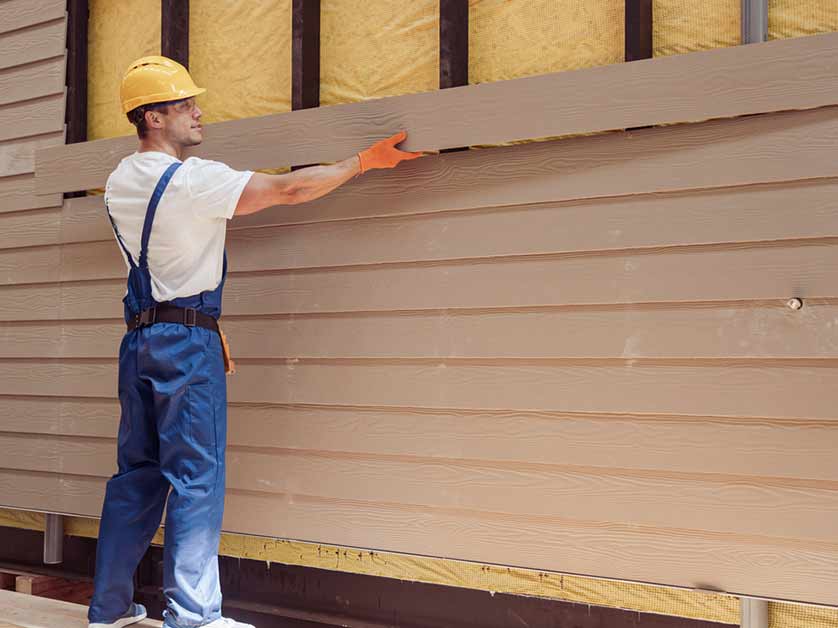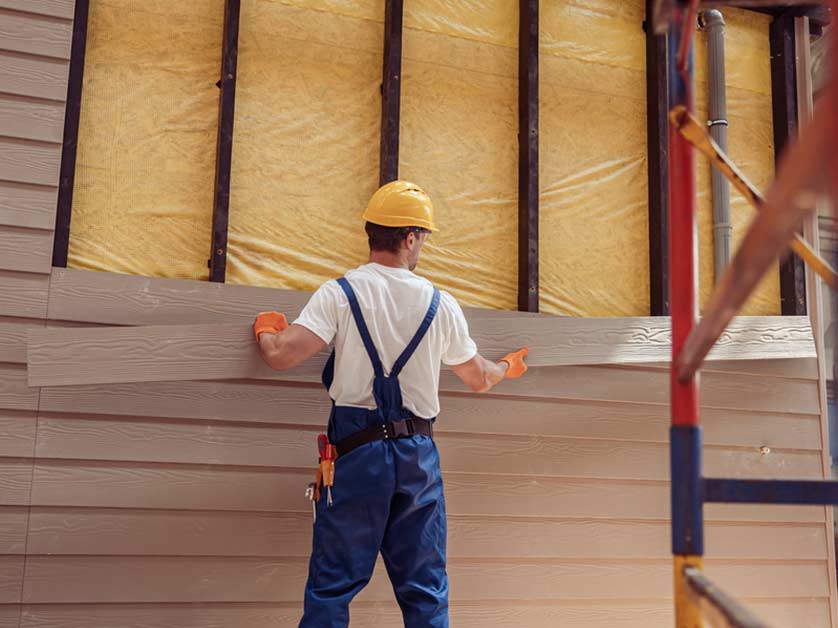Morris Siding Contractor with Years of Expertise in Home Exterior Upgrades
Morris Siding Contractor with Years of Expertise in Home Exterior Upgrades
Blog Article
The Crucial Guide to the Different Kinds Of Exterior Siding and Their Special Benefits
In the realm of home improvement, picking the best home siding is a critical decision that impacts both aesthetic appeal and useful efficiency. With so several choices to consider, which exterior siding material genuinely stands out for your certain task?
Timber Exterior Siding
Timber home siding, a popular option for property outsides, offers a timeless visual that integrates natural charm with structural honesty. This home siding product is readily available in different styles, including clapboard, tiles, and board-and-batten, enabling home owners to tailor their appearance to match their layout preferences. Timber home siding is commonly crafted from resilient varieties such as cedar, redwood, or yearn, which are recognized for their resilience and ability to endure environmental stress factors.
Among the primary advantages of wood house siding is its excellent insulation buildings, which can add to energy performance and reduced heating expenses. Additionally, wood siding is eco-friendly, making it an eco-friendly option when sourced sustainably. Regular maintenance, including paint or staining, can prolong its life expectancy and boost its look, enabling house owners to protect the all-natural appeal of the timber.
Nonetheless, prospective drawbacks consist of sensitivity to parasites, rot, and climate damages, necessitating appropriate treatment and maintenance - morris siding contractor. In spite of these problems, when correctly looked after, timber home siding can give a long lasting and gorgeous option that boosts the personality of a home while offering a cozy, welcoming ambience

Vinyl Siding
Plastic home siding has actually become a leading selection for property owners looking for a low-maintenance exterior alternative that incorporates durability and price. This flexible product is crafted from polyvinyl chloride (PVC), making it resistant to numerous climate condition, including wetness and UV rays. Because of this, plastic siding does not warp, rot, or fade, ensuring lasting aesthetic appeal.
One of the primary advantages of plastic exterior siding is its considerable variety of colors and designs, permitting property owners to attain the desired seek their residential property without the need for frequent repainting. Furthermore, plastic exterior siding is simple to mount, which can substantially decrease labor expenses throughout building and construction or renovation jobs.
Plastic siding likewise adds to power performance. Many options function insulation backing, which boosts thermal efficiency, helping to maintain comfortable indoor temperature levels and possibly decreasing energy bills. Its smooth surface area promotes very easy cleansing, calling for just routine cleaning with a yard hose pipe to get rid of dust and particles.
Fiber Concrete Exterior Siding
Fiber cement exterior siding has actually obtained traction among builders and property owners alike due to its remarkable mix of durability and visual convenience. Made up of a blend of sand, cement, and cellulose fibers, this home siding choice is engineered to stand up to extreme climate condition, including high winds, hefty rainfall, and temperature fluctuations, making it a durable option for domestic exteriors.

One of the key benefits of fiber concrete siding is its resistance to bugs, such as termites, and its non-combustible nature, offering enhanced fire safety. morris siding contractor. In addition, it is offered in a wide variety of structures, shades, and styles, allowing house owners to attain their desired visual without giving up performance
Another benefit is its low maintenance demands; fiber concrete home siding generally needs paint or discoloration every 5-10 years, which is much less frequent than other products. Furthermore, its durability adds to a reduced total price of ownership, as it decreases the need for regular repair services or substitutes.
Ultimately, fiber cement siding represents an exceptional investment for those looking for a durable, attractive, and versatile exterior choice, integrating both type and function to improve the home's curb appeal.
Steel Exterior Siding
The appeal of metal exterior siding hinges on its durable resilience and modern visual appeal, making it a popular selection for modern design. Available in products such as light weight aluminum and steel, steel home siding uses a variety of shades and surfaces, allowing homeowners to achieve a personalized appearance that matches their style vision.

Power efficiency is another significant advantage, as numerous metal exterior siding items are made with insulation alternatives that aid manage interior temperature levels. This can bring about lowered power costs gradually. Furthermore, metal exterior siding is typically recyclable, making it an eco-friendly choice for sustainability-minded house owners.
The installment procedure for metal siding can be relatively uncomplicated, causing a quicker turn-around time for building tasks. On the whole, steel home siding combines functionality and style, making it a sensible alternative for those looking for a enduring and aesthetically enticing outside finish.
Brick and Rock House Siding
Brick and stone home siding sticks out as a timeless selection that boosts the aesthetic appeal of any type of home. Understood for their resilience and low upkeep, these materials supply an exceptional return on financial investment while raising the residential property's curb allure. Offered in numerous shades, his explanation textures, and patterns, block and stone can be customized to fit varied architectural designs, from conventional to modern-day.
One of the key advantages of brick try this website and rock siding is their power efficiency. Both materials possess all-natural insulating buildings that help control interior temperatures, potentially minimizing cooling and heating costs. Furthermore, they use premium fire resistance compared to other home siding alternatives, adding to enhanced safety.
One more benefit is their durability. Block and rock can last for years, often requiring very little upkeep beyond occasional cleaning. Unlike wood exterior siding, they are impervious to bugs and rot, making sure a long-lasting outside that withstands the elements.
Conclusion
In summary, the selection of exterior siding substantially affects a home's aesthetic appeal, energy efficiency, and upkeep needs. Each sort of exterior siding-- whether wood, vinyl, fiber steel, concrete, or block and stone-- provides distinct benefits customized to numerous house owner preferences and environmental problems. Recognizing these choices allows informed choices that improve both the longevity and aesthetic charm of residential exteriors. Ultimately, picking the ideal exterior siding is vital for achieving an equilibrium between functionality and design in residential design.
One of the primary benefits of timber click here to read home siding is its outstanding insulation residential properties, which can contribute to energy performance and lower heating prices. Additionally, wood home siding is biodegradable, making it an ecologically pleasant option when sourced sustainably.One of the main advantages of steel siding is its resistance to different environmental aspects.Power efficiency is one more considerable benefit, as many metal home siding items are developed with insulation alternatives that aid regulate indoor temperature levels. Each kind of house siding-- whether wood, vinyl, fiber steel, block, or concrete and rock-- provides special benefits tailored to different home owner preferences and ecological conditions.
Report this page